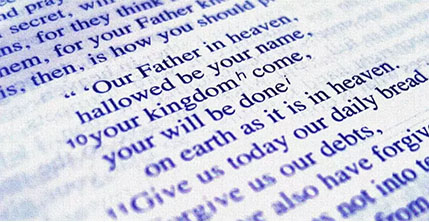Growing up in the Methodist church, I learned the Lord’s Prayer at an early age. We said it in church every Sunday. I suppose the line that most captured my imagination and caused me to think about my theology was the phrase, ”Thy Kingdom come, thy will be done on earth just as it is in heaven.” Perhaps like a lot of people, I couldn’t imagine how anything close to God’s perfect will in heaven could come to pass on earth. Earth is fallen and so filled with evil . Why bother trying to emulate heaven where surely everything is perfect as perfect can be. Billy Graham once said, “We will all be perfect in heaven because we will be in God’s presence and no sin can exist in His presence.” Well, there seems to be plenty of sin on earth, so what’s the point of trying to eradicate it. Sin is like a cancer that continues to grow, and despite our best efforts, it still sometimes spreads throughout our bodies.
As I grew in my faith, I began to realize the goal of transforming earth to become like a little slice of heaven was not necessarily the point. Yes, we DO want to bring about God’s justice on earth, but the real point is to align ourselves and our will with the will and purpose of God. This phrase from the Lord’s Prayer is meant to be a battle cry in the struggle to make God’s Kingdom a reality in our lives. God is challenging us as believers to put God’s will before ours and then expect amazing things to happen. The Scottish pastor, William Barclay, once said, “When we pray we are not praying for resignation; we are praying for triumph!”
How do we become more selfless and allow God’s will to work in our lives? We must seek to model our lives after Jesus, who in John said, “I seek not to please myself but Him who sent me.” All of us at times seek to do nothing but please ourselves. I want what I want, and I want it now. And yet God calls us to lay our own needs and desires aside.
There is a great deal of talk today by politicians and others about demanding and defending our freedoms. On its face, what could be wrong with that? We should have the freedom to speak out, to assemble, to worship as we choose. And yet with freedom comes responsibility. The apostle Paul would say, “All things are permissible but not everything is beneficial.” In Corinthians he writes, “Make sure this liberty of yours does not become a stumbling block to the weak.” I sense with some folks that their freedom is their license to ignore the needs of others. I believe God is concerned with the greater good in our world, even if it means we sometimes put aside what we want to do or say. If we genuinely want to implement God’s will on earth, we must pray and ask the question, how will my actions or words show my love for God and my neighbor?
– Rev. Dave Poteet, Pastor of Congregational Care



